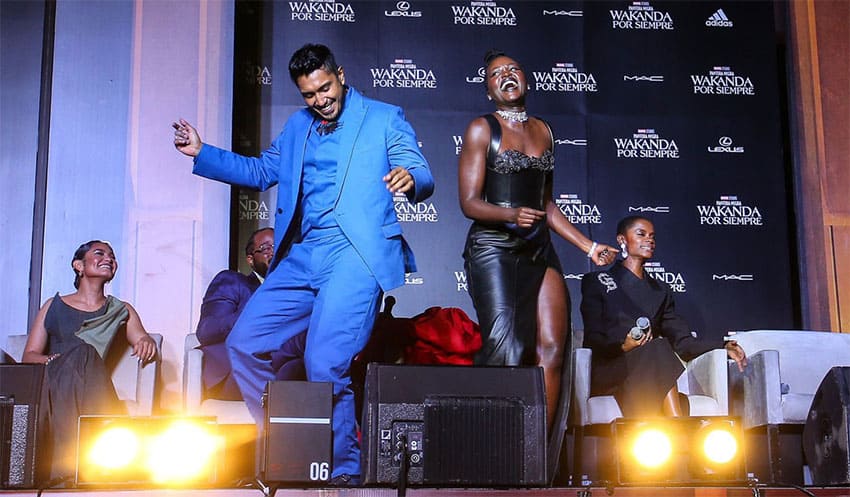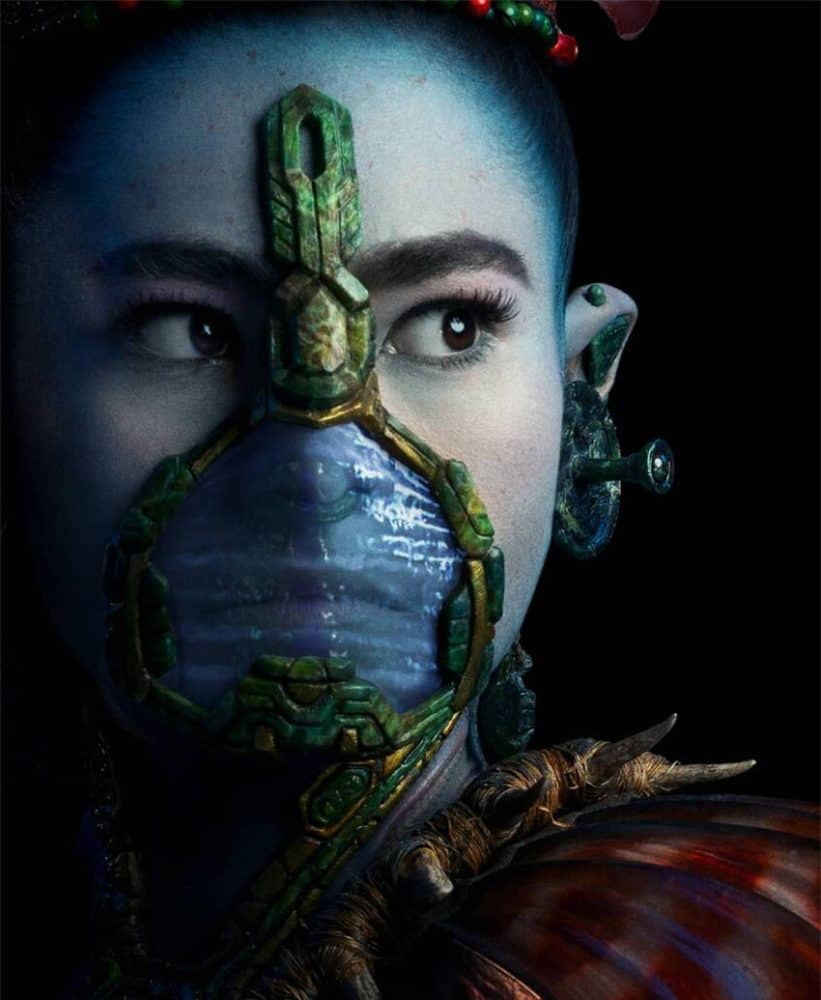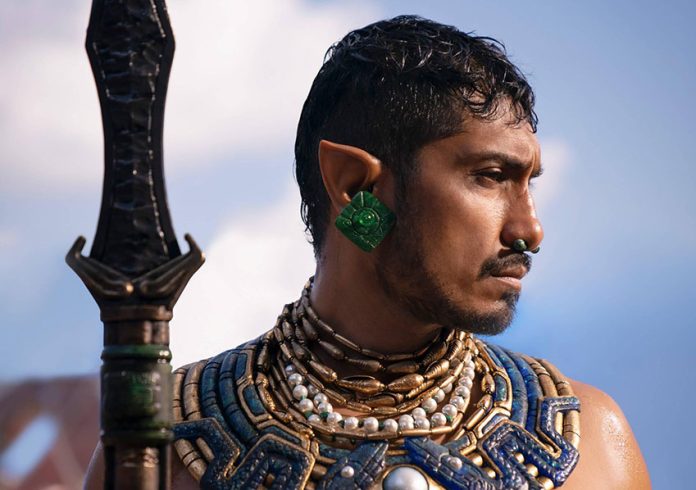The second movie in Marvel’s “Black Panther” superhero series — which debuted in Mexico on Thursday and is projected to have a humongous opening in the United States this weekend — has a significant amount of Mexican blood and culture pulsing through its veins.
Most notably, Tenoch Huerta stars as the movie’s villain, Namor the Sub-Mariner, who leads his blue-skinned, water-breathing people on an invasion of the futuristic country of Wakanda. Seen previously as the drug lord Rafael Caro Quintero in Netflix’s “Narcos: Mexico,” Huerta, 41, was born in Ecatepec in the state of México.
“Black Panther: Wakanda Forever” also features Mabel Cadena, 32, in the smaller role of Namor’s cousin, a warrior character named Namora. Cadena was born in Naucalpan in the state of México, grew up in Minatitlán, Veracruz, and can speak Náhuatl (more on that later).
Another main character, Nakia, is played by Lupita Nyong’o, an Academy Award winner in 2014 for best supporting actress in “12 Years a Slave.” Nyong’o, 39, was born in Mexico City to Kenyan political refugees parents who opted to give her the Mexican name Lupita, a diminutive of Guadalupe. Her family moved back to Africa when she was 1, but Nyong’o returned to Mexico as a teen to learn Spanish and lived in Taxco, Guerrero, for seven months. She identifies as Mexican and Kenyan, and these days lives in Brooklyn, N.Y.

Huerta, Cadena and Nyong’o appeared together on Thursday at the Mexican premiere of the 161-minute movie (rated PG-13) at the Cinépolis Plaza Satélite in Naucalpan. Director Ryan Coogler also was present at the red-carpet event, at which Huerta and Nyong’o showed off some dance moves to “Suavemente” by Elvis Crespo and Nyong’o spoke about the feminine power that pulsates through the new movie.
“Black Panther: Wakanda Forever” is the sequel to the 2018 blockbuster based on the Marvel Comics character Black Panther. A sequel was a foregone conclusion after the first one grossed more than US $1.3 billion worldwide, broke numerous box office records and was the highest-grossing film ever directed by a Black filmmaker.
However, planning for the sequel took a sharp turn when the star of the first “Black Panther,” Chadwick Boseman, died in 2020 at age 43 after a private battle against stage 4 colon cancer. Marvel opted to not recast his role of T’Challa, the king of Wakanda known as Black Panther. So for the sequel, T’Challa has died and Wakanda is now a shaky empire — opening the door for the nation of Talokan to stage an overthrow led by its king, Namor.
Huerta plays that character — a quick-tempered, mutant spawn of a human sea captain and a princess from Atlantis — with aplomb, and the role is expected to mark a huge jump in his career. Huerta is also hoping the movie creates a demand for Mexican and other Latin American talent, including those (such as himself) who have brown skin.
“I hope that this film empowers and opens the eyes of producers and directors and platforms in Latin America,” he said at the premiere in Naucalpan, “so that they understand that [Latino] representation matters [and] sells. We are the majority and we deserve to be on the screen.”
In June, Huerta was featured in a Vice.com exposé headlined “New ‘Black Panther’ Star is Calling Out Mexico for its Racism,” so his happiness over the Latin presence in “Wakanda Forever” is palpable. The movie “generates new horizons, new narratives,” he said.
Huerta and others playing characters from Talokin had to learn how to speak a bit of a Mayan language for their roles. It was challenging, they said, although Cadena’s ability to speak Náhuatl (the largest indigenous language still spoken in Mexico) made it a bit easier for her.
Cadena described working on the movie, which also includes a lot of Mexican folklore, as “super beautiful” and especially wonderful because the movie includes “a lot of faces from Latin America.”

“I feel very emotional to see a face like mine — that represents many stories, many struggles behind it — being part of [the Marvel] universe,” she said. “For me it means being part of a movement [will] open doors in narratives, in the industry, in the stories — and it fills me with faith and enthusiasm for the generations to come.
“I am living a dream that I never had,” she added. “As superheroes in this film … we are extolling the beauty of Latin American culture [and of] beautiful Mayan faces. Our path has not been easy.”
The movie also includes a lot Mexican, Latino and Mesoamerican music. Composer Ludwig Göransson spent time in Mexico City and Lagos familiarizing himself with local music, and the end result is a staggeringly diverse soundtrack.
Namor’s birth scene, for example, is amplified by Mexican singer Vivir Quintana and Mexican rapper-activist Mare Advertencia Lirika’s haunting vocals on “Árboles Bajo El Mar.” Other pivotal scenes are soundtracked by the dreamy sounds and vocals of Mexican singer Foudeqush on “Con La Brisa,” and there’s also a song by Santa Fe Klan, a 22-year-old rapper from Guanajuato.
Coogler, the director, said the film aims to highlight the cultures of Mexico and Africa and how, after being colonized, the people sustained their traditions and didn’t back down.
“We had experts in Mesoamerican and Mayan culture, we approached different professors from various universities, who helped us to carry out the entire process of the correct representation of culture,” he said.
“Black Panther: Wakanda Forever” is currently playing at movie theaters across North America, including many locations in Mexico.
With reports from Informador and Pitchfork
